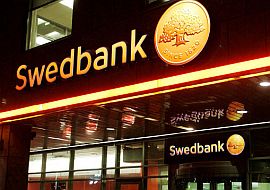Analytics, Baltic States – CIS, Economics, Financial Services, GDP, Lithuania, Markets and Companies, Wages
International Internet Magazine. Baltic States news & analytics
Friday, 19.04.2024, 05:30
Swedbank: geopolitical tensions in the East will continue to affect Lithuania's economy in 2015
 Print version
Print version |
|---|
In the first 11 months of 2014, export of Lithuanian origin goods to Russia grew by 6.5%. Moreover, Russia accounted for 21.1% of Lithuania's total exports. According to Maciulis, the figures show that "such unfading Lithuanian businesses' love" has further increased Lithuanian economy's dependence on Russia. In 2015, this will be felt by Lithuanian trading, transport and tourism sector.
According to the economist, events of recent weeks, cheaper oil and depreciated rouble will determine that the decline of Russian economy will reach 6% and will be greater than in 2009.
Based on preliminary calculations of Swedbank, Russia's GDP will recede by almost a quarter, expressed in euro. Lithuania should compensate for most of the losses in the Russian market by increasing export to the EU and other markets.
For this reasons Swedbank has reduced Lithuania's GDP growth projections by 1%age point to 2.3%. Domestic consumption will remain the engine of Lithuania's economic growth. Cheaper oil will also give a positive impetus. According to Maciulis, oil will be by 35% cheaper this year compared to the last. Because of this, Lithuanian households should save around EUR 236 million, or 1% of the total expenditure of households. Decreasing costs of energy resources prompted Swedbank economists to reduce inflation projections to 0.7% in 2015.
"With geopolitical unrest continuing and economic environment deteriorating, people most probably will not be spending their saved euros but keep them for "a rainy day"," says Maciulis.
Despite external challenges salaries in Lithuania should rise by around 5%, although up to 7 times less new jobs will be created.
"Last year approximately 20,000 jobs were created, while this year the figure will be 7 times lower at around 3,000," said Maciulis.
If the ruling coalition decides to raise the minimum monthly wage, it will be done because of political but not economic reasons, claims Nerijus Maciulis, Chief Economist of bank Swedbank.
"There will be no budgetary possibilities, we project that budget revenue will fall behind the plan already in the first half (of 2015 – ELTA). Inflation will be very low, reaching only around 0.5%. This means that rising prices will not be a factor that would decrease purchasing power of workers receiving the minimum monthly wage," said Maciulis.
On Tuesday, 27 January, Swedbank revised Lithuania's GDP growth projections and reduced them from 3.3 to 2.3%. The bank also projects that inflation in 2015 will stand at 0.7 and not 1.5% as previously thought. Unemployment in 2015 should decrease to 9.7%. However, according to Maciulis, 7 times less new jobs will be created than last year – around 3,000.
According to the economist, more favourable time to increase the minimum monthly wage would be in 2016, when Lithuania's GDP is forecast to grow by 3.6% and prices to rise by around 2%.
Maciulis says that increasing the minimum monthly wage will be a political decision as long as its rise is not linked to the average monthly wage and remains the prerogative of politicians.
As reported, the minimum monthly wage was increased in October 2014 from EUR 289 to EUR 300. The ruling coalition has been considering to increase it again since 1 July to EUR 325. The issue will be considered at the Tripartite Council on Tuesday.








 «The Baltic Course» Is Sold and Stays in Business!
«The Baltic Course» Is Sold and Stays in Business!

